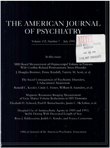Factors associated with suicide attempts by depressed older adults: a prospective study
Abstract
OBJECTIVE: This study sought to ascertain demographic, clinical, and interpersonal factors prospectively associated with suicide attempts by older adults with major depressive disorder. METHOD: Elderly inpatients diagnosed as having major depressive disorder according to the Research Diagnostic Criteria were administered a structured diagnostic interview and then followed up for 1 year. Factors bearing on the interpersonal context of depression, including the emotional adjustment of patients' spouses and adult children, interpersonal strains, and relatives' concerns related to the care of their depressed family members, were also ascertained at the time of the patients' hospital admission. The elderly patients who attempted suicide during the follow-up period were compared with the nonattempters across demographic, clinical, and interpersonal factors assessed during the initial interviews. RESULTS: A suicide attempt was made by 8.7% (N = 11) of the 126 elderly depressed patients within 1 year after hospital admission. Compared with the nonattempters, the attempters were of a higher socioeconomic status, evidenced more past suicide attempts and current suicidal behavior, and constituted a disproportionately large percentage of those patients who had never had a remission of their index depressive episodes. Notably, the spouses and adult children of patients who later attempted suicide evidenced more psychiatric symptoms, more strain in the relative-patient relationship, and more difficulties in caring for the patient than the relatives of nonattempters. CONCLUSIONS: The findings emphasize the need for careful attention to both clinical and interpersonal factors in the assessment of suicide risk in the elderly.
Access content
To read the fulltext, please use one of the options below to sign in or purchase access.- Personal login
- Institutional Login
- Sign in via OpenAthens
- Register for access
-
Please login/register if you wish to pair your device and check access availability.
Not a subscriber?
PsychiatryOnline subscription options offer access to the DSM-5 library, books, journals, CME, and patient resources. This all-in-one virtual library provides psychiatrists and mental health professionals with key resources for diagnosis, treatment, research, and professional development.
Need more help? PsychiatryOnline Customer Service may be reached by emailing [email protected] or by calling 800-368-5777 (in the U.S.) or 703-907-7322 (outside the U.S.).



